 W
WTransnational organized crime (TOC) is organized crime coordinated across national borders, involving groups or markets of individuals working in more than one country to plan and execute illegal business ventures. In order to achieve their goals, these criminal groups use systematic violence and corruption. Common transnational organized crimes include conveying drugs, conveying arms, trafficking for sex, toxic waste disposal, materials theft and poaching.
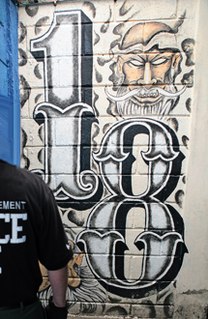 W
W18th Street, also known as Calle 18, Barrio 18, Mara 18, or simply La 18 in Central America, is a multi-ethnic transnational criminal organization that started as a street gang in Los Angeles. It is one of the largest transnational criminal gangs in Los Angeles, with 30,000 to 50,000 members between the United States, Mexico, and Central America and is also allied with the Mexican Mafia, another US-based crime organization. A United States Department of Justice report featured the following statement regarding 18th Street and rival gang MS-13, "These two gangs have turned the Central American northern triangle into the area with the highest homicide rate in the world."
 W
WThe Bandidos Motorcycle Club is classified as a motorcycle gang by law enforcement and intelligence agencies in numerous countries. While the club has denied being a criminal organization, Bandidos members have been convicted of partaking in criminal enterprises including theft, extortion, prostitution, drug trafficking and murder in various host nations.
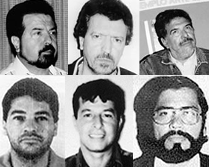 W
WThe Cali Cartel was a drug cartel based in southern Colombia, around the city of Cali and the Valle del Cauca Department. Its founders were the brothers Gilberto Rodríguez Orejuela and Miguel Rodríguez Orejuela, and José Santacruz Londoño. They broke away from Pablo Escobar and his Medellín associates in the late 1980s, when Hélmer "Pacho" Herrera joined what became a four-man executive board that ran the cartel.
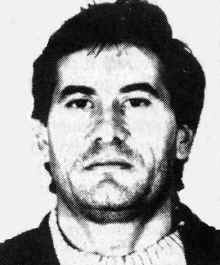 W
WThe Casalesi clan is a clan within the Camorra, an Italian criminal organization, operating from San Cipriano d’Aversa in the province of Caserta between Naples and Latium. Formed by Antonio Bardellino, it is a confederation of clans in the Caserta area. The Casalesi clan is believed to be one of the most powerful groups within the Camorra, specialising in construction and keeping a lower profile than clans that focus on drug dealing.
 W
WColloquially, a coyote is a person who smuggles immigrants across the Mexico–United States border. The word "coyote" is a loanword from Mexican Spanish that usually refers to a species of North American wild dog (Canis latrans).
 W
WThe Cuntrera-Caruana Mafia clan was a Mafia clan of the Cosa Nostra and held a key position in the illicit drug trade and money laundering for Cosa Nostra in the 1980s and 1990s. The Italian press baptized the clan as "The Rothschilds of the Mafia" or "The Bankers of Cosa Nostra".
 W
WLa Familia Michoacana, La Familia, or LFM is a Mexican drug cartel and organized crime syndicate based in the Mexican state of Michoacán. Formerly allied to the Gulf Cartel—as part of Los Zetas—it split off in 2006. The cartel was founded by Carlos Rosales Mendoza, a close associate of Osiel Cárdenas. The second leader, Nazario Moreno González, known as El Más Loco, preached his organization's divine right to eliminate enemies. He carried a "bible" of his own sayings and insisted that his army of traffickers and hitmen avoid using the narcotics they produce and sell. Nazario Moreno's partners were José de Jesús Méndez Vargas, Servando Gómez Martínez and Enrique Plancarte Solís, each of whom has a bounty of $2 million for his capture, and were contesting the control of the organization.
 W
WThe Foreign Narcotics Kingpin Designation Act, also known as the Kingpin Act, became law by the enactment of the Intelligence Authorization Act for Fiscal Year 2000. The U.S. international narcotics trafficking bill was introduced in the United States House of Representatives as H.R. 3164 on October 28, 1999. The Kingpin Act legislation passed by a margin of three hundred and eighty-five to twenty-six in the United States House of Representatives on November 2, 1999.
 W
WThe Gulf Cartel is a criminal syndicate and drug trafficking organization in Mexico, and perhaps one of the oldest organized crime groups in the country. It is currently based in Matamoros, Tamaulipas, directly across the U.S. border from Brownsville, Texas.
 W
WNumerous police and international intelligence agencies classify the Hells Angels Motorcycle Club as a motorcycle gang and contend that members carry out widespread violent crimes, including drug dealing, trafficking in stolen goods, gunrunning, and extortion, and are involved in prostitution. Members of the organization have continuously asserted that they are only a group of motorcycle enthusiasts who have joined to ride motorcycles together, to organize social events such as group road trips, fundraisers, parties, and motorcycle rallies, and that any crimes are the responsibility of the individuals who carried them out and not the club as a whole. Members of the club have been accused of crimes and/or convicted in many host nations.
 W
WThe Almighty Latin King and Queen Nation is one of the largest Hispanic and Latino street and prison gangs worldwide. The gang was founded in Chicago, Illinois in 1954.
 W
WThe Licciardi clan is a powerful Neapolitan Camorra clan that operates in the remote areas of Naples, specifically in the Secondigliano district and its stronghold of Masseria Cardone. Its sphere of influence extends to Scampia, Chiaiano, Miano and San Pietro a Patierno.
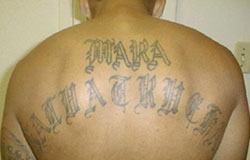 W
WMara Salvatrucha, commonly known as MS-13, is an international criminal gang that originated in Los Angeles, California, in the 1970s and 1980s. Originally, the gang was set up to protect Salvadoran immigrants from other gangs in the Los Angeles area. Over time, the gang grew into a more traditional criminal organization. MS-13 is defined by its cruelty, and its rivalry with the 18th Street gang.
 W
WThe 'Ndrangheta is a prominent Italian Mafia-type organized crime syndicate and criminal society based in the region of Calabria and dating back to the late 18th century. It is considered to be among the most powerful and dangerous organized crime groups in the world. Since the 1950s, following wide-scale emigration from Calabria, the organization has established itself worldwide. The 'Ndrangheta is the only one of the mafia-type criminal organizations operating in Italy to have maintained the rites that distinguished it in the past, passing them down orally and through codes that, on rare occasions, have been discovered. It is characterized by a horizontal structure made up of autonomous clans known as 'ndrine, based almost exclusively on blood ties. Its main activity is drug trafficking, of which it has a monopoly in Europe, but it also deals with arms trafficking, money laundering, extortion, loan sharking, prostitution. It is capable of heavily influencing local and national politics and infiltrating large sectors of the legal economy. In 2013 they purportedly made €53 billion according to a study from Demoskopika Research Institute.A US diplomat estimated that the organization's narcotics trafficking, extortion and money laundering activities accounted for at least three per cent of Italy's GDP in 2010.
 W
WThe Sinaloa Cartel, also known as the CDS, the Guzmán-Loera Organization, the Pacific Cartel, the Federation and the Blood Alliance, is a large international drug trafficking, money laundering, and organized crime syndicate established in Mexico during the late 1980s as one of a various number of "plazas" operating under a predecessor organization known as the Guadalajara Cartel. It is based in the city of Culiacán, Sinaloa, with operations in many world regions but primarily in the Mexican states of Sinaloa, Baja California, Durango, Sonora, and Chihuahua. It also has a notable presence in a number of other regions in Latin America as well as in cities across the U.S. The CDS was partially splintered in 2008 when the Beltrán-Leyva brothers broke apart from the cartel. The United States Intelligence Community generally considers the Sinaloa Cartel to be the most powerful drug trafficking organization in the Western Hemisphere, making it perhaps even more influential and capable than the infamous Medellín Cartel of Colombia during its prime. It has repeatedly been said to be one of the strongest criminal organizations in the world and indisputably the most powerful in Mexico since at least the late 2000s and early 2010s by various sources including the Los Angeles Times.
 W
WThe Tijuana Cartel or Arellano-Félix Organization is a Mexican drug cartel based in Tijuana, Baja California, Mexico. Founded by the Arellano-Felix family, the cartel once was described as "one of the biggest and most violent criminal groups in Mexico". However, since the 2006 Sinaloa Cartel incursion in Baja California and the fall of the Arellano-Félix brothers, the Tijuana Cartel has been reduced to a few cells. In 2016, the organization became known as Cartel Tijuana Nueva Generación and began to align itself under the Jalisco New Generation Cartel, along with Beltrán Leyva Organization (BLO) to create an anti-Sinaloa alliance, in which the Jalisco New Generation Cartel heads. This alliance has since dwindled as the Tijuana Cartel, Jalisco New Generation Cartel and Sinaloa Cartel all now battle each other for trafficking influence in the city of Tijuana and the region of Baja California.
 W
WA tong is a type of organization found among Chinese immigrants predominantly living in the United States, with smaller numbers in Canada, Australia and the United Kingdom. In Chinese, the word tong means "hall" or "gathering place". These organizations are described as secret societies or sworn brotherhoods and are often tied to criminal activity. In the 1990s, in most American Chinatowns, clearly marked tong halls could easily be found, many of which have had affiliations with Chinese organized crime.
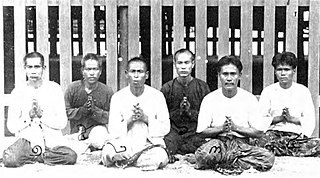 W
WA triad is a Chinese transnational organized crime syndicate based in Greater China and has outposts in various countries with significant overseas Chinese populations.
 W
WThe Sixth Yamaguchi-gumi is Japan's largest yakuza organization. It is named after its founder Harukichi Yamaguchi. Its origins can be traced back to a loose labor union for dockworkers in Kobe before World War II.
 W
WLos Zetas is a Mexican criminal syndicate, regarded as one of the most dangerous of Mexico's drug cartels. They are known for engaging in brutally violent "shock and awe" tactics such as beheadings, torture, and indiscriminate murder. While primarily concerned with drug trafficking, the organization also runs profitable sex trafficking and gun running rackets. Los Zetas also operate through protection rackets, assassinations, extortion, kidnappings and other activities. The organization is based in Nuevo Laredo, Tamaulipas, directly across the border from Laredo, Texas. The origins of Los Zetas date back to the late 1990s, when commandos of the Mexican Army deserted their ranks and began working as the enforcement arm of the Gulf Cartel. In February 2010, Los Zetas broke away and formed their own criminal organization, rivalling the Gulf Cartel.
 W
WZwi Migdal was an organized-crime group by Polish Jewish individuals, founded in Poland and based mainly in Argentina, that trafficked in Jewish women from Central Europe for sexual slavery and forced prostitution.